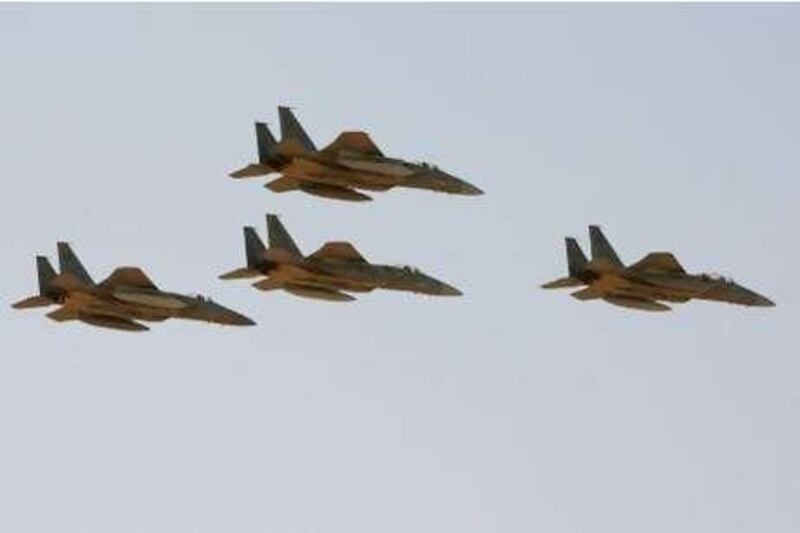WASHINGTON // The White House is preparing to pitch the largest single arms deal in US history to Congress next week: the sale of advanced naval and missile weaponry worth US$60 billion (Dh220bn) to Saudi Arabia. US lawmakers are expected to approve the deal as part of a broader US effort to strengthen Arab countries against what they see as an increasingly powerful Iran.
While the plans will certainly face scrutiny from Israel's supporters in the US Congress, the deal also represents a confluence of US, Israeli and Saudi interests. Despite its wariness of Saudi Arabia, Israel would probably at least tacitly support any deterrent to Iran's growing regional power. Meanwhile, the presidential administration of Barack Obama is touting the deal as a possible source of 75,000 high-skilled, high-value jobs in the midst of one of the worst periods of unemployment in the United States since the Great Depression.
"Obviously, Israel's major security concern these days is against Iran, so altering the balance of forces in the Gulf against Iran and in favour of Saudi Arabia is not something the Israelis are going to be against," said Gregory Gause, a political science professor at the University of Vermont and an expert on Middle East security. "I think it's interesting that the pro-Israelis are not really mobilising against it, which gives some sense of at least an implicit strategic understanding between the US, Saudi Arabia and Israel," Mr Gause said.
Easing Israel's security concerns are negotiations with Benjamin Netanyahu's government to purchase about 20 F-35 fighter jets, which are more technologically advanced than the F-15s the Saudis are considering. The Israeli newspaper Haaretz, quoting an unnamed Israeli security official, said Israel's ministry of defence expressed concerns about the US-Saudi deal last month dur tion. To reassure the Israelis, the officials decided to exclude certain long-range weapons components from the F-15 jets.
Except for the potential deal's size, much of the arrangement is rather unremarkable, Mr Gause and other analysts said. Iranian power has grown substantially in the region over the past decade, prompting concerns both from Israel and its traditional Arab rivals. In addition to the Islamic republic's large population of 66.5 million people and an economy that is ranked 19th in the world in GDP, Iran has aided Hizbollah in southern Lebanon and Hamas in the Palestinian territories. Both are Islamist militias and political parties that frequently clash with Israel and are seen as destabilising elements by the traditionally dominant Arab regimes.
In that sense, the size of the arms purchase is the natural culmination of years of increasing anxiety about Iran that began under the administration of George W Bush, Mr Obama's predecessor. The United States is also negotiating arms deals with Kuwait, Oman and the UAE, according to the Associated Press. US weapons sales to the Gulf states reached $40bn between 2005 and 2008 - more than double the amount sold to the Gulf states between 2001 and 2004. Overall military spending in the Middle East rose by 34 per cent over the period 1999 to 2008, the Stockholm International Peace Research Institute says.
Even without the projected US-Saudi arms deal, Riyadh's military capability already far exceeds that of Iran, whose expansive military is well-suited to defending its own territory but is quite incapable of launching a long-term attack beyond its own borders, said Gary Sick, a professor of international and public affairs at Columbia University in New York and an expert on Iran. Iran "can launch a single bombing raid, but to actually invade, to project power over any period of time, it really doesn't have that capability", Mr Sick said. "Saudi Arabia's technical capability … is far greater in both numbers and technical capability than Iran. In that sense, they're way ahead of the game."
The Obama administration is seeking congressional approval to allow the Saudis to purchase more than 80 of the F-15s as well as nearly 200 Apache, Black Hawk and Little Bird helicopters, according to The Wall Street Journal, which broke the story on Monday. The Saudis are also engaged in separate negotiations with the Americans for an additional $30bn weapons deal to update its navy. That is quite a lot of hardware for a military that, while well-funded, remains relatively short on manpower and technical expertise. The Saudi military will have to strain to absorb its new technological strength, Mr Sick said.
The more likely application of the weapons purchase, he said, will be for US and other western militaries in case of an Iranian attack on Israel or the Gulf region. "Part of this, which nobody talks about, is the fact that Saudi Arabia knows that it really cannot defend itself against any of its larger neighbours and it relies on the United States for that," Mr Sick said. "It means, as it did in the days of the US invasion of Iraq and before that the defence of Kuwait, that the United States' forces can move into that area and have equipment there that they're familiar with, that is in excellent operating shape with lots of spares and ammunition and can basically go right to work."
mbradley@thenational.ae





